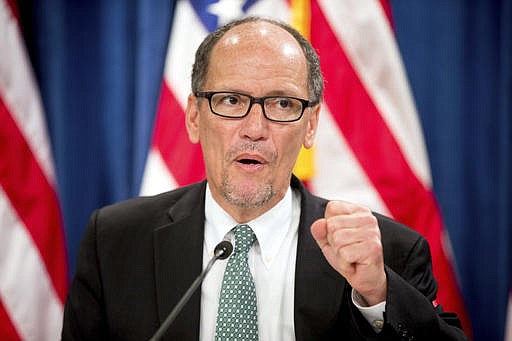Thanks to a federal judge's ruling in Texas last week, the proposed new federal overtime rules supposed to go into effect across the country today officially are on hold.
That's true for Missouri state government, too, even as a number of businesses around the nation already have implemented changes to meet the new rule requirements and plan to continue following the rules while they're challenged in the federal courts.
"We are closely monitoring the situation," Office of Administration spokeswoman Ryan Burns told the News Tribune this week.
Beth Riggert, communications counsel for the state Supreme Court, said this week: "The judiciary has reviewed many positions throughout the state courts to examine what changes might be appropriate to comply with the new federal rules.
"Whether to implement any changes, however, remains under review."
The U.S. Labor Department oversees implementation of the federal Fair Labor Standards Act (FLSA), which generally requires employees to be paid at least minimum wage - currently $7.25 an hour - for up to 40 hours each week, with time-and-a-half ($10.88 an hour for a minimum-wage worker) paid for each hour worked over that 40 hours.
Since Congress originally passed the FLSA in 1938, it has included exceptions to the overtime requirements for "any employee employed in a bona fide executive, administrative or professional capacity" - what's known as the "EAP exemption."
In its 2004 modifications to the FLSA regulations, the Labor department set $23,660 a year as a minimum salary needed to qualify for an exemption. Under the revised regulations intended to begin today, that minimum jumped to $47,476, with future adjustments every three years.
Unless their salaries were raised above the minimum level, people who have been working as salaried employees were required to shift to a per-hour income.
But U.S. District Judge Amos L. Mazzant said, in a 20-page order issued Nov. 22: "Congress did not intend salary to categorically exclude an employee with EAP duties from the exemption."
Supporters have argued the updated rules provided new protections to an estimated 4 million workers who have been salaried, giving those workers more pay for the long hours they often work.
Nevada and 20 other states - not including Missouri - challenged the proposed rules changes in the U.S. District Court for Eastern Texas.
Mazzant blocked the new rules from going into effect for now, while he hears more arguments in the case.
Mazzant wrote last week: "The Court finds the public interest is best served by an injunction. If the Department lacks the authority to promulgate the Final Rule, then the Final Rule will be rendered invalid, and the public will not be harmed by its enforcement.
"However, if the Final Rule is valid, then an injunction will only delay the regulation's implementation."
Burns said in mid-November that, if the federal changes go into effect, state department administrators will need to "diligently monitor their payroll expenses and adjust accordingly to minimize the impact of increased costs related to newly non-exempt employees. It will be a learning process for all involved "
The state House and Senate aren't affected by the changes.
Both House Chief Clerk Adam Crumbliss and Senate Administrator Marga Hoelscher noted the federal regulations exempt "an employee in the legislative branch or legislative body of that State, political subdivision, or agency (who) is not employed by the legislative library "
Crumbliss added: "We are actively monitoring federal activity on this matter (and) are acutely aware of the compensation challenges faced by state employees as being among the lowest in the nation, as well as the current state revenue outlook."
The proposed changes also have little impact on Jefferson City or Cole County government operations, or the services they provide.
"The city of Jefferson has not implemented any changes at this point, but is prepared to do so once the changes go into effect," City Human Resources Director Gail Strope told the News Tribune. "Since the majority of our employees are non-exempt, the law does not have a large impact on us."
Jill LaHue, the county commission's attorney, said, "All but one person making less than the new minimum (already) was considered non-exempt (and) eligible for overtime."

